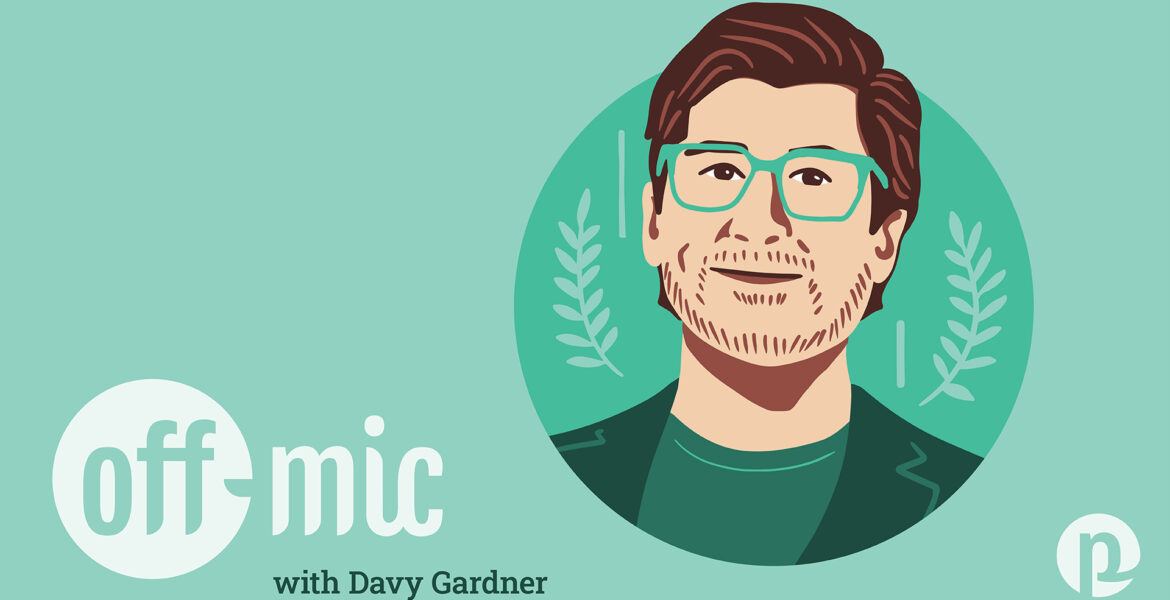Off Mic: Why Tribeca Festival is going all-in with audio

In this series, we’re putting the spotlight on our partners and industry friends. Why did they decide to explore an original podcast for their brand? What surprises did they encounter? How do they measure success? What lessons did they learn along the way? Find out from the people at the helm.
The journey
Davy Gardner considers himself a writer, more than anything else. Even as a teenager, however, he understood the power of audio on a visceral level. Like many of his peers growing up with social media, he found himself getting distracted from his day-to-day life by overwhelming anxiety. That’s when he discovered meditation tapes.
“I think it was as early as eighth or ninth grade,” he says. “It was a CD by Jon Kabat-Zinn. It was guided meditations. There were all these meditations — if you are familiar with it — like bodyscape meditation, breathscape meditation.
“I just did the introduction to it. It changed how I was physically in my body.”
It was an eye-opening moment for Gardner, allowing him to understand how his thoughts could change his body chemistry, the way he physically felt — especially when he got to the soundscape meditation CD.
“They have a full meditation on just listening. It’s not listening like trying to hear something,” adds Gardner. On the CD, Kabat-Zinn described it as “letting what’s already there just kind of bathe your ears. And I know that sounds odd. But there was something about that was just really interesting and informed later when I was making audio — how important it is to have the texture of sound.”
After graduating from Macalester College with a history degree, Gardner soon began writing for Upright Citizens Brigade Theatre in New York. One of his pieces written for the stage got picked up by Radiotopia, which led to a series of jobs in the podcasting industry, including stints with Wondery and Audible.
Audio at Tribeca
Today, as the Head of Tribeca Audio and Curator of Audio Storytelling, Davy is expanding the definition of what constitutes compelling audio when it comes to scheduling events for Tribeca Festival’s audio program.
“It was a no-brainer when I was thinking about audio storytelling to be as inclusive as possible, you know. To just be open to all kinds of stories in sound. To me that includes a sound rich audio book. It includes a narrative podcast. It includes fiction and nonfiction. It includes audio memoir, narrative journalism. And some interview shows — when they’re crafted with a structure,” he says.
Branded audio also makes the cut at the festival primarily known for celebrating independent projects, adds Gardner.
“There are so many ways to finance a podcast, and that’s just one of them. I think that in many scenarios, a brand that can trust artists to do what they do best, and get behind and support those artists — that’s a fantastic relationship. There might not be the same number of conflicting notes with a distributor, or whatever kind of difficult relationship there could be,” he says, laughing.
“I think branded audio storytelling in some ways is carving out a space out for itself unnecessarily. I think it’s just audio storytelling, and the finances are the finances. I will say that at Tribeca we clearly believe that with Tribeca X — our program that’s dedicated to branded storytelling across all media.”
The festival is elevating the audio medium to a level of recognition that is afforded to other media such as film and television. The Tribeca Festival was launched in 2001, as an attempt to revitalize Manhattan after the attacks on the World Trade Centre. Today, it’s seen as an international destination for a multimedia celebration, he says.
“I feel like a lot of creators have this craving for audio forward celebration of their work. There’s so many festivals that focus on the industry, and there’s a place for that. Those festivals are crucial…. [W]hat I love about Tribeca is that it puts the work first. I think there’s a real hunger for that,” he says.
This includes giving audio the full red carpet treatment, bringing a Hollywood-like vibe to the event.
“It sounds silly, but I think it matters — culturally.
“I always feel slightly awkward talking about prestige. But at the end of the day, in order to celebrate the actual cultural impact that podcasts have had, they need to be afforded that same treatment that television, film and other media have.”
It helps that actual celebrities will make an appearance. Gardner lists off events such as Conan O’Brien’s podcast interviewing Paul McCartney, Crooked Media’s Pod Save America doing a live taping with special guests, and NYT’s Modern Love podcast Live with Kim Cattrall. The festival also gives space for emerging and established audio artists to preview their work, he says.
“Hearing creators talk about what went into making their piece is what I think will change the perception that making a podcast is somehow easy … Among popular audiences, people think making a podcast is easy. It’s not. It’s just not.”
Tribeca Festival runs from June 7 to 18 in New York City. The Audio Storytelling program celebrates groundbreaking contributions to the world of audio, with a mix of premieres, talks, live podcast recordings and other special events.
Tribeca X celebrates the intersection between advertising and entertainment.
Season 4 of Teamistry, a podcast produced by Pacific Content for Atlassian, is an official selection for the 2023 Tribeca X award for Audio. We will be in attendance at the festival this year and would love to see you there!
Sign up for the Pacific Content Newsletter: audio strategy, analysis, and insight in your inbox.
